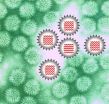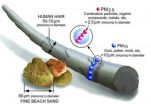(Press-News.org) An international research group led by Arizona State University professor Qiang "Shawn" Chen has developed a new generation of potentially safer and more cost-effective therapeutics against West Nile virus, and other pathogens.
The therapeutics, known as monoclonal antibodies (MAbs) and their derivatives, were shown to neutralize and protect mice against a lethal dose challenge of West Nile virus---even as late as 4 days after the initial infection.
"The overarching goal of our research is to create an innovative, yet sustainable and accessible, low cost solution to combat the global threat of West Nile virus," said Chen, a researcher at Arizona State University's Biodesign Institute and professor in the Department of TEIM.
West Nile virus is spread by infected mosquitoes, and targets the central nervous system. It can be a serious, life-altering and even fatal disease and currently, there is no cure or drug treatment against West Nile virus, which has been widely spread across the U.S., Canada, Latin America and the Caribbean.
"The goal of this latest research was twofold," said Chen. "First, we wanted to show proof-of-concept, demonstrating that tobacco plants can be used to manufacture large and complex MAb-based therapeutics. Secondly, we've wanted to improve the delivery of the therapeutic into the brain to combat West Nile virus at the place where it does the greatest harm."
The study appears in the March 27 online edition of PLOS ONE. Along with Chen, the research team included Junyun He, Huafang "Lily" Lai, Michael Engle, Sergey Gorlatov, Clemens Gruber, Herta Steinkellner and long-time Washington University collaborator Michael S. Diamond.
Chen's group has been a pioneer in producing MAbs as therapeutic candidates in plants, including tobacco and lettuce plants. A couple of years ago, his team demonstrated that their first candidate, pHu-E16, could neutralize West Nile infection and protect mice from exposure. MAbs target proteins found on the surface of West Nile virus.
However, this antibody was not to be able to accumulate at high levels in the brain.
One approach to tackle this challenge is to program into the therapeutic antibodies the capability of binding to receptors that can help the MAbs to cross into the brain. Chen wanted to use this strategy to produce a more effective way to combat West Nile virus.
In the new study, they improved upon their pHu-E16 design, making half a dozen new variants that could, for the first time, lead to the development of MAbs that effectively target the brain and neutralize West Nile virus.
Mice were infected with a lethal dose of West Nile virus, and increasing amounts of a MAb therapeutic were delivered as a single dose the same day of infection. In another experiment, Chen's team tested whether the therapeutic, called Tetra pHu-E16, could be effective after infection. In this case, the therapeutic was administered 4 days after West Nile virus infection, when the virus has already spread to the brain. In each case, they protected up to 90 percent of the mice from lethal infection.
This is the first instance of such an effect and makes possible neutralizing West Nile virus even after infection by a tetravalent MAb. The tetravalent MAbs design will offer the researchers greater flexibility toward selection of disease, tissue and antigen targets.
For Chen, this also gives promise to his team developing a plant-based system to dramatically reduce the costs of commercial manufacturing of MAbs.
"This study is a major step forward for plant-based MAbs, and also demonstrates for the first time the capacity of plants to express and assemble large, complex and functional tetravalent MAb complexes," said Chen.
MAbs are a hot and highly competitive research field, having been shown to effectively target cancer, autoimmune and inflammatory diseases. Now a $60 billion market for the biotechnology and pharmaceutical sectors, growth of the market has been hampered by high development costs of producing these in animal cell systems, which when factoring in a long period for manufacturing, R&D and clinical trials, may reach around $1 billion per each therapeutic candidate.
Therapeutic MAbs are typically made in animal host cells and assembled into Y-shaped complexes. Until now, tetravalent MAbs had never been made in a plant system before. To make the potential therapeutics, the group is able to use young tobacco plants and a protein expression system to make and harvest the proteins in the leaves.
For the study, MAbs were rapidly produced in tobacco plants in as little as ten days, giving promise to change the image of scourged product that causes lung cancer into a manufacturing system for societal benefits against infectious diseases.
"It is our hope that these results may usher in new age of cost-effective, MAbs therapeutics against WNV and other neurological diseases," said Chen. "Our next step is to move this forward with the development of bifunctional MAbs that can target to the brain with the ultimate goal of entering human clinical trials."
INFORMATION:
Using tobacco to thwart infectious disease?
New tobacco plant produced therapeutics effective against West Nile virus, even days after infection
2014-03-27
ELSE PRESS RELEASES FROM THIS DATE:
How rotavirus infection accelerates autoimmune diabetes in a mouse model
2014-03-27
A combination of genetic predisposition and environmental factors is believed to cause autoimmune (type 1) diabetes. A study published on March 27th in PLOS Pathogens gets at the mechanisms by which rotavirus infection contributes to autoimmune diabetes in a mouse model of the disease.
NOD (for non-obese diabetic) mice are prone to develop diabetes, and infection with rotavirus accelerates onset of the disease. Barbara Coulson and colleagues, from The University of Melbourne, Australia, tested the hypothesis that the virus does this by inducing "bystander activation". ...
Genetic variation linked to heart disease risk through RNA machinery
2014-03-27
Researchers have pinpointed a new mechanism of how natural variation in our DNA alters an individual's risk for developing heart disease by interfering with the ability of a developmental gene to interact with a specialized type of RNA. This work expands on previous work identifying the "hidden" causes of complex disease risk, with the goal of unlocking new pathways and potential drug targets for cardiovascular disease.
This latest study led by Thomas Quertermous, MD at Stanford University and Georg Sczakiel, PhD at the University of Lübeck (Germany) was a joint effort ...
Ancient African cattle first domesticated in Middle East
2014-03-27
Geneticists and anthropologists previously suspected that ancient Africans domesticated cattle native to the African continent nearly 10,000 years ago. Now, a team of University of Missouri researchers has completed the genetic history of 134 cattle breeds from around the world. In the process of completing this history, they found that ancient domesticated African cattle originated in the "Fertile Crescent," a region that covered modern day Iraq, Jordan, Syria and Israel.
In their study published in PLOS Genetics, Prof. Decker (University of Missouri) and a team of international ...
Autoimmune drug may help prevent kidney disease caused by diabetes
2014-03-27
Washington, DC (March 27, 2014) — A drug currently used to treat autoimmune disease may also help prevent the kidney-damaging effects of diabetes, according to a study appearing in an upcoming issue of the Journal of the American Society of Nephrology (JASN). The findings suggest that clinical trials should be designed to test the drug in diabetic patients.
Kidney disease is one of the most serious complications of diabetes. Diabetics who develop kidney disease, or diabetic nephropathy, due to high blood glucose levels may eventually require dialysis or a kidney transplant. ...
Major depression linked with nearly twice the risk of kidney failure in diabetics
2014-03-27
Washington, DC (March 27, 2014) — Major depression may increase diabetes patients' risk of developing kidney failure, according to a study appearing in an upcoming issue of the Clinical Journal of the American Society of Nephrology (CJASN). Additional studies are needed to determine whether treatment for depression can improve kidney health in patients with diabetes.
Individuals with diabetes have a high prevalence of depressive symptoms, which has previously been linked with negative health outcomes such as cardiovascular disease and premature death. Little is known ...
Gulf War illness not in veterans' heads, but in their mitochondria
2014-03-27
Researchers at the UC San Diego School of Medicine have demonstrated for the first time that veterans of the 1990-91 Persian Gulf War who suffer from "Gulf War illness" have impaired function of mitochondria – the energy powerhouses of cells.
The findings, published in the March 27, 2014 issue of PLOS ONE, could help lead to new treatments benefitting affected individuals – and to new ways of protecting servicepersons (and civilians) from similar problems in the future, said principal investigator Beatrice A. Golomb MD, PhD, professor of medicine.
Golomb, with associate ...
Stroke patients should receive customized palliative care
2014-03-27
People recovering from a stroke should have a well-coordinated medical team to personalize care, optimize quality of life and minimize suffering, according to a scientific statement published in the American Heart Association journal Stroke.
The statement is the first in the United States to outline fundamental palliative care for stroke survivors. Palliative care is patient- and family-centered care that improves life by anticipating, preventing and treating suffering.
"The majority of stroke patients need access to some form of palliative medicine," said Robert Holloway, ...
Consistent blood pressure control may cut rate of second stroke in half
2014-03-27
Stroke survivors who consistently control their blood pressure may reduce the likelihood of a second stroke by more than half, according to new research in the American Heart Association journal Stroke.
For the study, researchers analyzed the results from the Vitamin Intervention for Stroke Prevention (VISP) trial, which enrolled 3,680 ischemic stroke patients ages 35 and older in 1996-2003. Ischemic strokes are caused by a clot or other blockage in a blood vessel supplying the brain. Participants had been tested for several risk factors, including blood pressure levels ...
US clean-air efforts stay on target
2014-03-27
HOUSTON – (March 27, 2014) – National efforts in the last decade to clear the air of dangerous particulate matter have been so successful that most urban areas have already attained the next benchmark, according to new research by Rice University.
Atmospheric researchers at Rice studied the state implementation plans (SIPs) from 23 regions mandated by the Environmental Protection Agency to reduce particulate matter (PM) smaller than 2.5 microns (PM 2.5) to less than 15 micrograms per cubic meter by 2009.
The Rice analysis appears this week in the Journal of the Air ...
Mechanical forces driving breast cancer lead to key molecular discovery
2014-03-27
The stiffening of breast tissue in breast-cancer development points to a new way to distinguish a type of breast cancer with a poor prognosis from a related, but often less deadly type, UC San Francisco researchers have found in a new study.
The findings, published online March 16, 2014 in Nature Medicine, may lead eventually to new treatment focused not only on molecular targets within cancerous cells, but also on mechanical properties of surrounding tissue, the researchers said.
In a mouse model of breast cancer, scientists led by Valerie Weaver, PhD, professor of ...
LAST 30 PRESS RELEASES:
Modern twist on wildfire management methods found also to have a bonus feature that protects water supplies
AI enables defect-aware prediction of metal 3D-printed part quality
Miniscule fossil discovery reveals fresh clues into the evolution of the earliest-known relative of all primates
World Water Day 2026: Applied Microbiology International to hold Gender Equality and Water webinar
The unprecedented transformation in energy: The Third Energy Revolution toward carbon neutrality
Building on the far side: AI analysis suggests sturdier foundation for future lunar bases
Far-field superresolution imaging via k-space superoscillation
10 Years, 70% shift: Wastewater upgrades quietly transform river microbiomes
Why does chronic back pain make everyday sounds feel harsher? Brain imaging study points to a treatable cause
Video messaging effectiveness depends on quality of streaming experience, research shows
Introducing the “bloom” cycle, or why plants are not stupid
The Lancet Oncology: Breast cancer remains the most common cancer among women worldwide, with annual cases expected to reach over 3.5 million by 2050
Improve education and transitional support for autistic people to prevent death by suicide, say experts
GLP-1 drugs like Ozempic could cut risk of major heart complications after heart attack, study finds
Study finds Earth may have twice as many vertebrate species as previously thought
NYU Langone orthopedic surgeons present latest clinical findings and research at AAOS 2026
New journal highlights how artificial intelligence can help solve global environmental crises
Study identifies three diverging global AI pathways shaping the future of technology and governance
Machine learning advances non targeted detection of environmental pollutants
ACP advises all adults 75 or older get a protein subunit RSV vaccine
New study finds earliest evidence of big land predators hunting plant-eaters
Newer groundwater associated with higher risk of Parkinson’s disease
New study identifies growth hormone receptor as possible target to improve lung cancer treatment
Routine helps children adjust to school, but harsh parenting may undo benefits
IEEE honors Pitt’s Fang Peng with medal in power engineering
SwRI and the NPSS Consortium release new version of NPSS® software with improved functionality
Study identifies molecular cause of taste loss after COVID
Accounting for soil saturation enhances atmospheric river flood warnings
The research that got sick veterans treatment
Study finds that on-demand wage access boosts savings and financial engagement for low-wage workers
[Press-News.org] Using tobacco to thwart infectious disease?New tobacco plant produced therapeutics effective against West Nile virus, even days after infection


